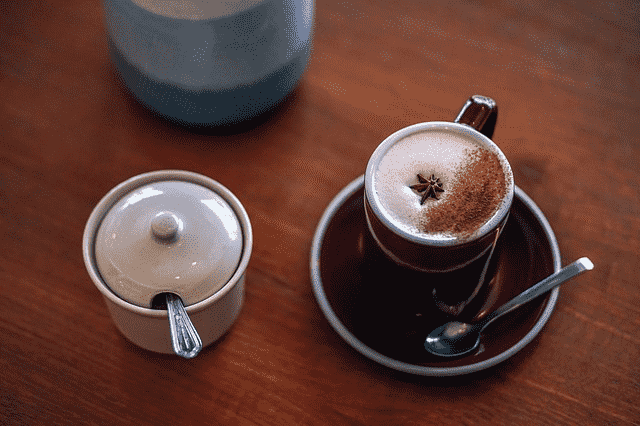

Chai Latte has its roots nestled firmly in the traditional practices of Indian Ayurvedic medicine. The name ‘Chai’ originates from the Hindi word for tea, and ‘Latte’ suggests the inclusion of milk in the recipe. But a cup of chai latte is much more than milk and tea leaves; it’s a harmonious blend of spices, sweeteners, and warmth, whisked together to create a sensory delight. Join us as we warmly welcome you to the captivating the health benefits of chai latte.
The chai latte helps to make you stay active, protects heart health, boost the immune system, reduces pains and aches. Now let us look at some essential and important health benefits of Chai Latte.


Table of Contents
Chai Latte, a delicious blend of black tea, milk, and spices, offers an array of health benefits as follows:
Chai latte is a great choice for getting your morning started and also to stay active throughout the day. This chai tea contains caffeine as it contains black tea leaves.
The amount of caffeine contained in the tea depends upon the variety and amount of black tea used. It acts as a body stimulant and contains caffeine that is enough to have you awake.
Effects of Chai Latte on digestion, it is an excellent drink for improving the digestive system and keeps your stomach healthy. The spices and herbs present in the chai help the digestive system.
The other spices like black pepper, cardamom, cinnamon help to avoid problems related to iron deficiency, liver disease, irritable bowel syndrome (IBS).
The black tea leaves have a positive impact on your gut and help to improve metabolism and prevent bloating.
The ginger present in the chai is responsible to reduce nausea and has been used to treat other common ailments related to nausea. The biological compound of ginger called gingerol and shogaol are used to reduce stomach pain associated with nausea and works to soothe an upset stomach.
The Chai tea helps in improving as well as controlling blood sugar levels in your body by lowering insulin resistance. This is because it contains cinnamon and ginger present in the chai tea.
Chai latte can help reduce aches and pains, and one of the most prominent types of pain is lower back pain. There are other things you can do to help relieve lower back pain.
Ginger reduces the inflammation that eases the pain ranging from headaches to migraine and also improves blood circulation. The clove present in the chai is also known to treat minor toothaches.
The black tea and cinnamon may help to lower bad cholesterol and blood pressure. Cinnamon contains compounds that help to fight diabetes, regulate blood sugar levels and can help to prevent cardiovascular disease.
The Chai tea may help to prevent weight gain as well as promotes weight loss in several ways. Chai generally made using cow’s milk which is a very good source of protein.
Black tea promotes fat breakdown and helps in reducing the calories that your body absorbs from foods. The black pepper in the chai tea also helps in preventing the accumulation of body fat.
The spices like cardamom, cinnamon, and ginger used in chai tea contain phytochemicals and antioxidants along with cancer-preventing properties.
Natural chai spices are used to stimulate digestive and pancreatic enzymes to help fat breakdown and help oxygen uptake. Ginger present in chai has a good gut- boosting properties and also improves the immune system.
The cloves in chai latte are one of the main ingredients that have the highest antioxidant content. The antiviral, antibacterial and anticancer properties help in reducing tumor growth.
Chai tea provides a satisfying beverage that can be a substitute for some of your daily coffee consumption. The caffeinated tea has less amount of caffeine content than coffee, while decaffeinated tea almost contains no caffeine.
You can have chai tea instead of coffee to gain more health benefits and to have a great taste. Black tea is rich in antioxidant that protects against free-radical damage.
The black tea helps to reduce the amount of bad cholesterol inside your body. It prevents the oxidation of LDL (low-density lipoprotein) cholesterol and also maintains the number of HDL (High-density lipoprotein) cholesterol. This helps to prevent cardiovascular disease like stroke and heart attack.
Despite these, the typical high sugar content found in commercial chai lattes may lessen these benefits, so it’s important to control consumption or consider healthier versions.
Ingredients:
Direction:
1. First of all roast Cardamom, clove, peppercorns, and cinnamon stick on a low heat flame around 2 to 3 minutes. Leave them to cool.
2. Grind the spices into a coarse powder using a spice grinder.
3. Using a saucepan, combine the water, ground spices, ginger and let the mixture simmer for 5 minutes.
4. Once the water has reached the desired temperature, pour over the black tea leaves and allow them to steep for 2 to 3 minutes.
5. Add warm whole milk with brown sugar or honey to taste.
6. To make chai latte, just add chai tea concentrate to a hot cup of steamed milk and add honey. Chai Latte traditionally contains more milk than a typical cup of normally brewed chai tea.
In conclusion, while a Chai Latte often serves as a warming indulgence or a comforting companion on a chilly day, its benefits extend far beyond its enjoyable taste. With every sip, you’re ingesting a cocktail of nutrients and antioxidants that aid in digestion, fortify your immune system, promote heart health, and potentially regulate blood sugar levels. Each spice contributes its unique health-boosting property, making Chai Latte a medley of wellness. However, due to potential high sugar content, moderation in consumption is recommended. As with any health-related choices, it’s always important to balance enjoyment with mindfulness. With its delightful layers of flavors and beneficial profile, Chai Latte offers an enjoyable way to enhance one’s holistic well-being. Here’s to wellness in every cup!
Helpful Resources:
1. Acai Bowl
2. Ginger Water
3. Best Exercises For A Complete Back Workout
In the relentless pursuit of entrepreneurial success, it’s easy to overlook the most vital asset—yourself.… Read More
A barrel sauna isn’t just a visually striking wellness addition—it’s an efficient and highly functional… Read More
Technology is an integral part of most teenagers' lives today. While devices and social media… Read More
LASIK is one of the most popular vision correction surgeries that offers you freedom from… Read More
Plumbing issues can arise unexpectedly, and understanding the costs involved is crucial for homeowners and… Read More
Skin aging is often associated with external factors like sun exposure and pollution, but inflammation… Read More